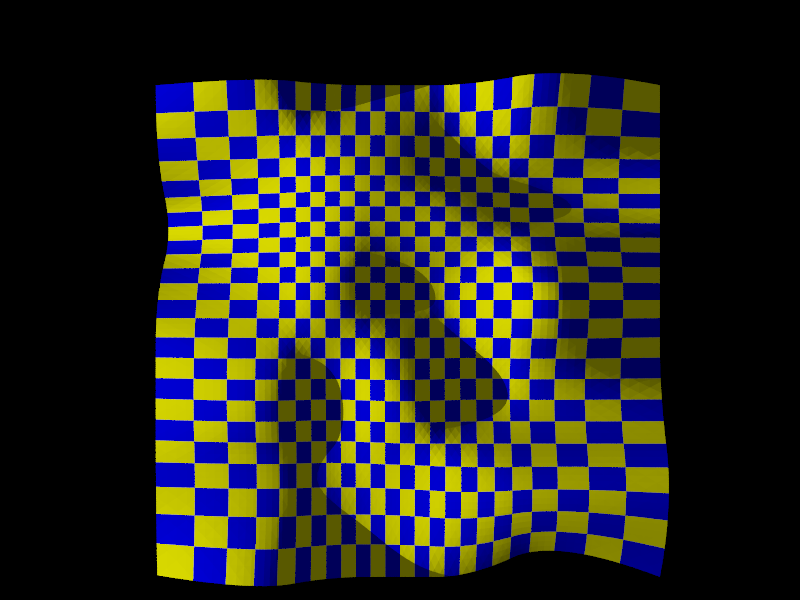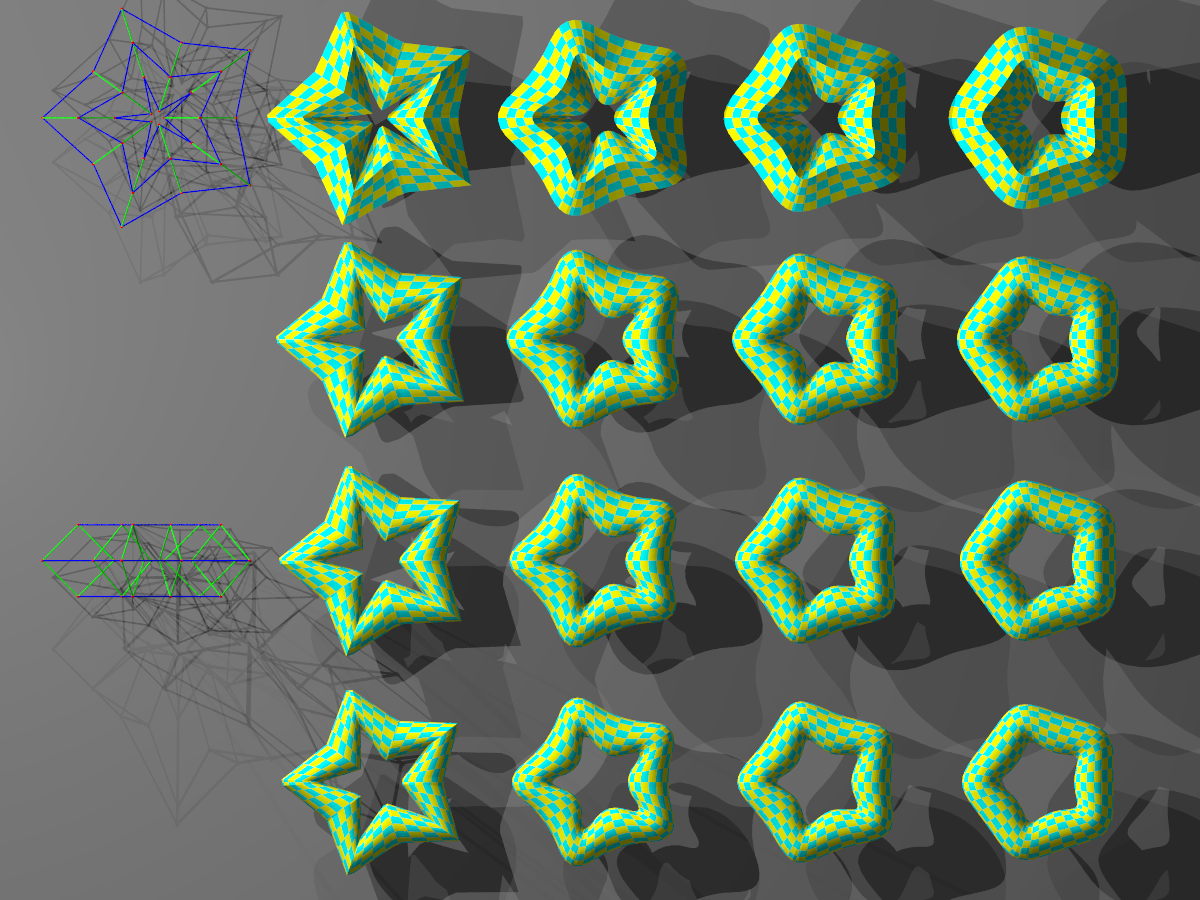Difference between revisions of "User:Le Forgeron/nurbs"
Jump to navigation
Jump to search
Le Forgeron (talk | contribs) |
Le Forgeron (talk | contribs) |
||
| (4 intermediate revisions by the same user not shown) | |||
| Line 1: | Line 1: | ||
| − | {{User:Le_Forgeron/HgPovray38/ | + | {{User:Le_Forgeron/HgPovray38/available}} |
== Nurbs == | == Nurbs == | ||
| − | + | <code>nurbs</code> is like <code>spline</code> : an invisible object | |
NURBS means Non Uniform Rational B-Spline. | NURBS means Non Uniform Rational B-Spline. | ||
| Line 26: | Line 26: | ||
</pre> | </pre> | ||
| − | * The | + | * The '''order''' must be at least 2 and at most `size` for each U & V coordinates. |
| − | * Along a sequence of knots, the values must not be decreasing. | + | * Along a sequence of knots, the values must not be decreasing: the next value can be the same or bigger. |
| − | * | + | * <code>nurbs</code> is one of the [[User:Le_Forgeron/UVMeshable|UVMeshable]] objects |
=== Drawing a nurbs === | === Drawing a nurbs === | ||
| Line 105: | Line 105: | ||
[[Image:LeForgeronNurbs.png| Nurbs]] | [[Image:LeForgeronNurbs.png| Nurbs]] | ||
| + | |||
| + | === closed nurbs === | ||
| + | |||
| + | Closed nurbs are achieved by having some special arrangement for the control points and knot sequence. For example, the knot sequence [ 0., 0., 0., 0., 0.25, 0.5, 0.75, 1.0, 1.0, 1.0, 1.0] with 7 control points (P1, P2,...to P7) will result in an open cubic B-spline curve (when the order is 3). If we change the knot sequence into [ -0.75, -0.5, -0.25, 0., 0.25, 0.5, 0.75, 1.0, 1.25, 1.5, 1.75] and make P5=P1, P6=P2 and P7=P3, then the curve will become a closed cubic B-spline curve with C2 continuity at the joint. | ||
| + | |||
| + | [[Image:LeForgeronTorusNurbs.png| Nurbs illustration]] | ||
| + | |||
| + | <source lang="pov"> | ||
| + | #version 3.7; | ||
| + | #global_settings{ max_trace_level 10 assumed_gamma 1.0 } | ||
| + | #include "finish.inc" | ||
| + | #declare Major=6;// Major radius of torus | ||
| + | #declare Minor=5;// Minor radius of torus | ||
| + | #declare MAX=5;// max order of nurbs to draw | ||
| + | #declare SPACE=(Major+Minor)*1.404;// Room around each object (radius) | ||
| + | #declare PTI=10;// number of minor circles along the major radius | ||
| + | #declare PTJ=4;// number of points on each minor circle | ||
| + | #declare RESOLUTION=64;// resolution of the mesh | ||
| + | |||
| + | |||
| + | camera { orthographic | ||
| + | location 130*y+SPACE*(MAX+1)*(x-z)-z*SPACE | ||
| + | direction -y | ||
| + | up (1+(MAX-1)*SPACE)*z*2 | ||
| + | right (1+(MAX-1)*SPACE)*2*x*image_width/image_height | ||
| + | } | ||
| + | |||
| + | #declare T = texture { pigment { uv_mapping checker | ||
| + | pigment{ color srgb <1,1,0> transmit 0.0 filter 0 } | ||
| + | pigment{ color srgb <0,1,1> transmit 0.0 filter 0 } | ||
| + | scale <1/4,1/4,1> | ||
| + | } }; | ||
| + | |||
| + | light_source { 10*y-10*x, 0.8 scale 10} | ||
| + | light_source { 10*y-10*z, 2/3 scale 10} | ||
| + | light_source { 10*y, 1/3 scale 10} | ||
| + | light_source { -10*z, 1/3 scale 10} | ||
| + | |||
| + | #macro P(I,J) | ||
| + | #local V=(mod(I,2)*Minor+Major)*x+(Minor)*<cos(pi*2*J/PTJ),sin(pi*2*J/PTJ),0>; | ||
| + | #local W=vrotate(V, 360*I/(PTI)*y); | ||
| + | W | ||
| + | #end | ||
| + | |||
| + | #macro NURBS(OrderU, OrderV) | ||
| + | nurbs{ | ||
| + | OrderU, OrderV, | ||
| + | #declare NBI=PTI+OrderU-1; | ||
| + | #declare NBJ=PTJ+OrderV-1; | ||
| + | NBI, NBJ, | ||
| + | #for(I,1,NBI+OrderU) | ||
| + | I, | ||
| + | #end | ||
| + | #for(J,1,NBJ+OrderV) | ||
| + | J, | ||
| + | #end | ||
| + | #for(J,1,NBJ) | ||
| + | #for(I,1,NBI) | ||
| + | #declare W= P(I,J); | ||
| + | <W.x,W.y,W.z,1> | ||
| + | #end | ||
| + | #end | ||
| + | } | ||
| + | #end | ||
| + | |||
| + | |||
| + | #include "NurbsMesh.inc" | ||
| + | #for(X,2,MAX) | ||
| + | #for(Y,2,MAX) | ||
| + | #declare Nurbs=NURBS(X,Y); | ||
| + | mesh { | ||
| + | UVMeshable( Nurbs, RESOLUTION, RESOLUTION ) | ||
| + | texture { T } translate SPACE*2*(X*x-Y*z) | ||
| + | } | ||
| + | #end | ||
| + | #end | ||
| + | |||
| + | #declare UN= union{ | ||
| + | #for(J,1,NBJ) | ||
| + | #for(I,1,NBI) | ||
| + | #declare W=P(I,J); | ||
| + | sphere {W, 0.2 texture { pigment { color srgb <1,0,0>}}} | ||
| + | #declare OLD=W; | ||
| + | #declare W=P(I,J+1); | ||
| + | cylinder{OLD,W,0.1 texture { pigment { color srgb <0,1,0>}}} | ||
| + | #declare W=P(I+1,J); | ||
| + | cylinder{OLD,W,0.1 texture { pigment { color srgb <0,0,1>}}} | ||
| + | #end | ||
| + | #end | ||
| + | } | ||
| + | |||
| + | object { UN translate SPACE*2*(x-2*z) } | ||
| + | object { UN rotate 90*x translate SPACE*2*(x-4*z) } | ||
| + | plane{ y,-Minor*2 texture { pigment { color srgb 0.5 } } } | ||
| + | |||
| + | </source> | ||
Latest revision as of 08:31, 2 September 2018
- Everything about HgPovray38 in User:Le_Forgeron/HgPovray38
- Code is available on branch hgpovray38 at https://github.com/LeForgeron/povray
Nurbs
nurbs is like spline : an invisible object
NURBS means Non Uniform Rational B-Spline.
syntax is
nurbs {
Uorder, Vorder,
Usize, Vsize
UKNOTS
VKNOTS
ULINE (repeated Vsize time)
[OBJECTS_MODIFIERS...]
}
ULINE := WEIGHTED_POINT (repeated Usize time)
WEIGHTED_POINT := < X, Y, Z, W >
UKNOTS := KNOT, (repeated Uorder+Usize time)
VKNOTS := KNOT, (repeated Vorder+Vsize time)
KNOT := float value
- The order must be at least 2 and at most `size` for each U & V coordinates.
- Along a sequence of knots, the values must not be decreasing: the next value can be the same or bigger.
nurbsis one of the UVMeshable objects
Drawing a nurbs
#version 3.7;
global_settings{ assumed_gamma 1.0 }
#declare UVMeshableObject = nurbs { 3,3,7,7
// u knots
0, 0, 0, 1/5, 2/5, 3/5, 4/5, 1, 1, 1
// v knots
0, 0, 0, 1/5, 2/5, 3/5, 4/5, 1, 1, 1
// first line of (x,y,z,w)
<-4.1894,-5.4790,0.0000,1.0000> <-4.1894,-4.3181,2.0249,1.0000>
<-4.1894,-2.8825,0.0000,1.0000> <-4.1894,-1.5000,0.0000,1.0000>
<-4.1894,-0.5000,0.0000,1.0000> <-4.1894,0.5000,0.0000,1.0000>
<-4.1894,1.5000,0.0000,1.0000>
// second line of (x,y,z,w)
<-2.6808,-4.8585,0.6794,1.0000>
<-2.6808,-4.3181,2.0249,1.0000> <-2.6808,-2.8825,0.0000,1.0000>
<-2.6808,-1.5000,3.2519,1.0000> <-2.6808,-0.5000,0.0000,1.0000>
<-2.6808,0.5000,0.0000,1.0000> <-2.6808,1.5000,3.2103,1.0000>
// third line of (x,y,z,w)
<-1.5000,-5.4790,0.0000,1.0000>
<-1.5000,-4.3181,2.0249,1.0000> <-1.5000,-2.8825,0.0000,1.0000>
<-1.5000,-1.5000,0.0000,1.0000> <-1.5000,-0.5000,1.2319,1.0000>
<-1.5000,0.5000,0.0000,1.0000> <-1.5000,1.5000,0.0000,1.0000>
// fourth line of (x,y,z,w)
<-0.5000,-5.4790,0.0000,1.0000>
<-0.5000,-4.3181,0.0000,1.0000> <-0.5000,-2.8825,1.7624,1.0000>
<-0.5000,-1.5000,0.0000,1.0000> <-0.5000,-0.5000,1.0000,1.0000>
<-0.5000,0.5000,1.0000,1.0000> <-0.5000,1.5000,0.0000,1.0000>
// fifth line of (x,y,z,w)
<0.5000,-5.4790,0.0000,1.0000>
<0.5000,-4.3181,0.0000,1.0000> <0.5000,-2.8825,0.0000,1.0000>
<0.5000,-1.5000,1.1552,1.0000> <0.5000,-0.5000,1.0000,1.0000>
<0.5000,0.5000,1.0000,1.0000> <0.5000,1.5000,0.0000,1.0000>
// sixth line of (x,y,z,w)
<1.5000,-5.4790,1.9780,1.0000>
<1.5000,-4.3181,0.0000,1.0000> <1.5000,-2.8825,1.7335,1.0000>
<1.5000,-1.5000,0.0000,1.0000> <1.5000,-0.5000,0.0000,1.0000>
<1.5000,0.5000,0.0000,1.0000> <1.5000,1.5000,1.5217,1.0000>
// seventh line of (x,y,z,w)
<2.9668,-5.4790,-0.2469,1.0000>
<2.9668,-4.3181,0.0000,1.0000> <2.9668,-2.8825,0.0000,1.0000>
<2.9668,-1.5000,0.0000,1.0000> <2.9668,-0.5000,-2.9599,1.0000>
<2.9668,0.5000,0.0000,1.0000> <2.9668,1.5000,0.0000,1.0000>
};
#declare Texture = texture { checker texture { pigment { color blue 1 } } texture { pigment { color rgb <1,1,0> } } }
#include "NurbsMesh.inc"
#declare UResolution = 92;
#declare VResolution = 92;
mesh {
UVMeshable( UVMeshableObject, UResolution, VResolution )
texture { uv_mapping Texture scale <1/24, 1/24, 1> }
}
light_source {+40*z+90*x, 1 }
camera { location uv_vertex( UVMeshableObject, 0.5, 0.5 ) +<0,0,40>
direction z
up y
right image_width/image_height*x
look_at uv_vertex( UVMeshableObject, 0.5, 0.5 )
angle 16
}
closed nurbs
Closed nurbs are achieved by having some special arrangement for the control points and knot sequence. For example, the knot sequence [ 0., 0., 0., 0., 0.25, 0.5, 0.75, 1.0, 1.0, 1.0, 1.0] with 7 control points (P1, P2,...to P7) will result in an open cubic B-spline curve (when the order is 3). If we change the knot sequence into [ -0.75, -0.5, -0.25, 0., 0.25, 0.5, 0.75, 1.0, 1.25, 1.5, 1.75] and make P5=P1, P6=P2 and P7=P3, then the curve will become a closed cubic B-spline curve with C2 continuity at the joint.
#version 3.7;
#global_settings{ max_trace_level 10 assumed_gamma 1.0 }
#include "finish.inc"
#declare Major=6;// Major radius of torus
#declare Minor=5;// Minor radius of torus
#declare MAX=5;// max order of nurbs to draw
#declare SPACE=(Major+Minor)*1.404;// Room around each object (radius)
#declare PTI=10;// number of minor circles along the major radius
#declare PTJ=4;// number of points on each minor circle
#declare RESOLUTION=64;// resolution of the mesh
camera { orthographic
location 130*y+SPACE*(MAX+1)*(x-z)-z*SPACE
direction -y
up (1+(MAX-1)*SPACE)*z*2
right (1+(MAX-1)*SPACE)*2*x*image_width/image_height
}
#declare T = texture { pigment { uv_mapping checker
pigment{ color srgb <1,1,0> transmit 0.0 filter 0 }
pigment{ color srgb <0,1,1> transmit 0.0 filter 0 }
scale <1/4,1/4,1>
} };
light_source { 10*y-10*x, 0.8 scale 10}
light_source { 10*y-10*z, 2/3 scale 10}
light_source { 10*y, 1/3 scale 10}
light_source { -10*z, 1/3 scale 10}
#macro P(I,J)
#local V=(mod(I,2)*Minor+Major)*x+(Minor)*<cos(pi*2*J/PTJ),sin(pi*2*J/PTJ),0>;
#local W=vrotate(V, 360*I/(PTI)*y);
W
#end
#macro NURBS(OrderU, OrderV)
nurbs{
OrderU, OrderV,
#declare NBI=PTI+OrderU-1;
#declare NBJ=PTJ+OrderV-1;
NBI, NBJ,
#for(I,1,NBI+OrderU)
I,
#end
#for(J,1,NBJ+OrderV)
J,
#end
#for(J,1,NBJ)
#for(I,1,NBI)
#declare W= P(I,J);
<W.x,W.y,W.z,1>
#end
#end
}
#end
#include "NurbsMesh.inc"
#for(X,2,MAX)
#for(Y,2,MAX)
#declare Nurbs=NURBS(X,Y);
mesh {
UVMeshable( Nurbs, RESOLUTION, RESOLUTION )
texture { T } translate SPACE*2*(X*x-Y*z)
}
#end
#end
#declare UN= union{
#for(J,1,NBJ)
#for(I,1,NBI)
#declare W=P(I,J);
sphere {W, 0.2 texture { pigment { color srgb <1,0,0>}}}
#declare OLD=W;
#declare W=P(I,J+1);
cylinder{OLD,W,0.1 texture { pigment { color srgb <0,1,0>}}}
#declare W=P(I+1,J);
cylinder{OLD,W,0.1 texture { pigment { color srgb <0,0,1>}}}
#end
#end
}
object { UN translate SPACE*2*(x-2*z) }
object { UN rotate 90*x translate SPACE*2*(x-4*z) }
plane{ y,-Minor*2 texture { pigment { color srgb 0.5 } } }

